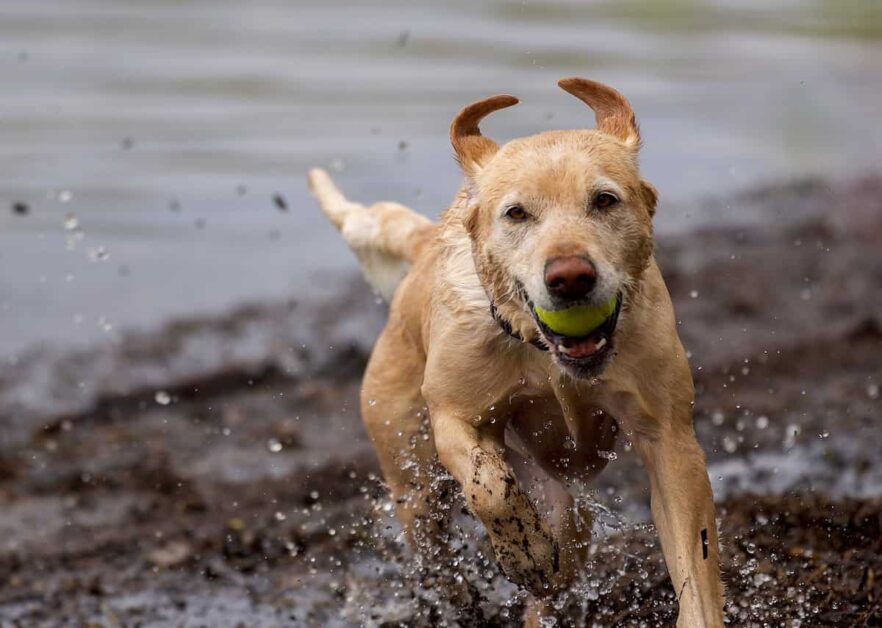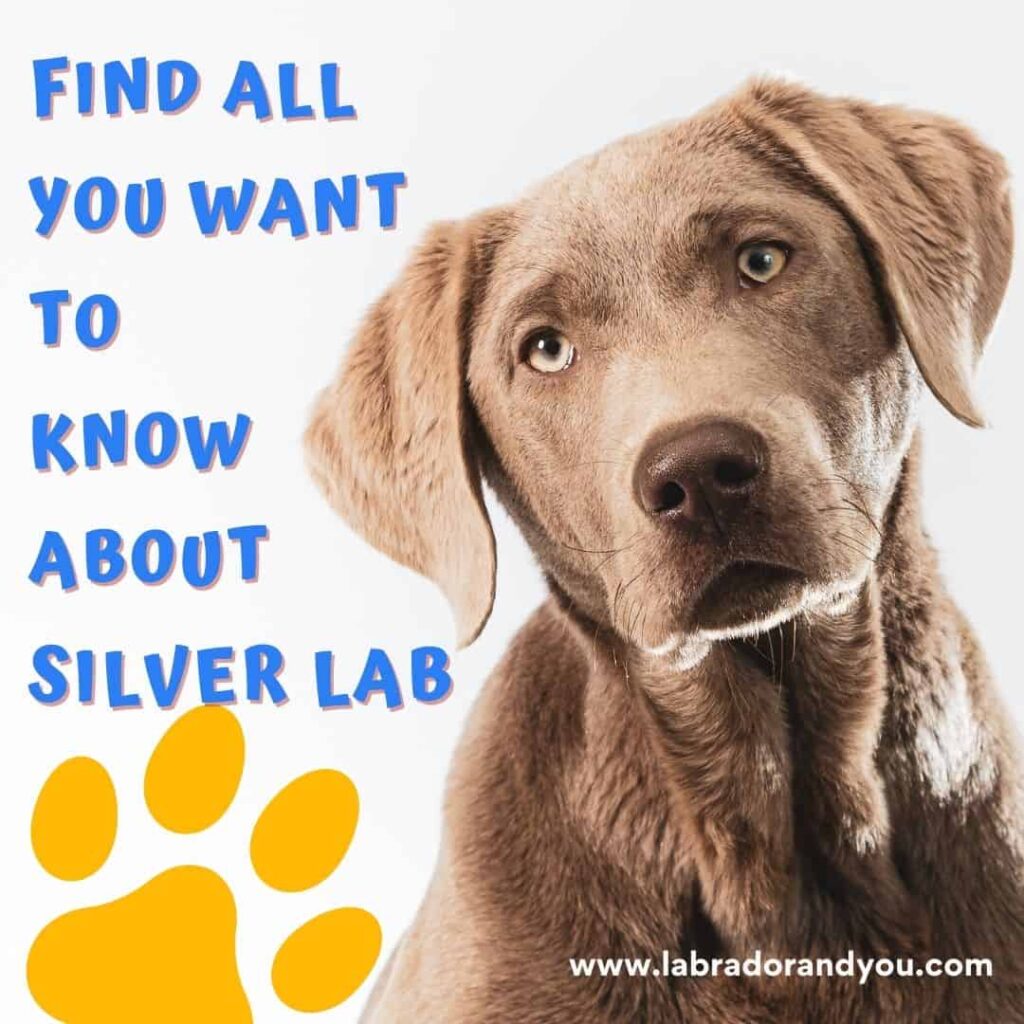Labrador retrievers are not naturally prone to pointing like some gun dog breeds, but they can be trained to develop strong pointing abilities. Pointing refers to when a dog adopts a frozen stance with its nose aimed at the game to mark the location for a hunter. Though not an innate behavior in Labs, they are intelligent and trainable enough to learn to point and hold steady on command when detecting birds.
With proper technique and repetitive training starting at a young age, Labs can become reliable pointers for land and waterfowl hunting. Their versatility and working drive mean Labradors can be taught to master the skill of pointing alongside their natural strengths as retrievers.
Labrador Retrievers: Overview Of The Breed
Labrador Retrievers are one of the most popular dog breeds in America. They are known for their friendliness, loyalty, and trainability.
Originally from Newfoundland, Canada, Labrador Retrievers are popular among other breeds globally. Known for their friendly and outgoing personality, they were initially bred to assist fishermen. They hauled nets and retrieved fishes that had escaped hooks.
Their intelligence, athleticism, and work ethic made them a favorable working dog. A labrador retriever can be a part of search and rescue operations and service animals.
Over time, Labradors have branched out into roles beyond fishing assistance. They’ve become a cherished family dog. It is due to their affectionate nature and adaptability to different environments.
They have remained prominent in the hunting scene. Their strong sense of smell has proven valuable when tracking down prey. Not only do Labradors excel at retrieving waterfowl but they also display an innate ability called “pointing.”
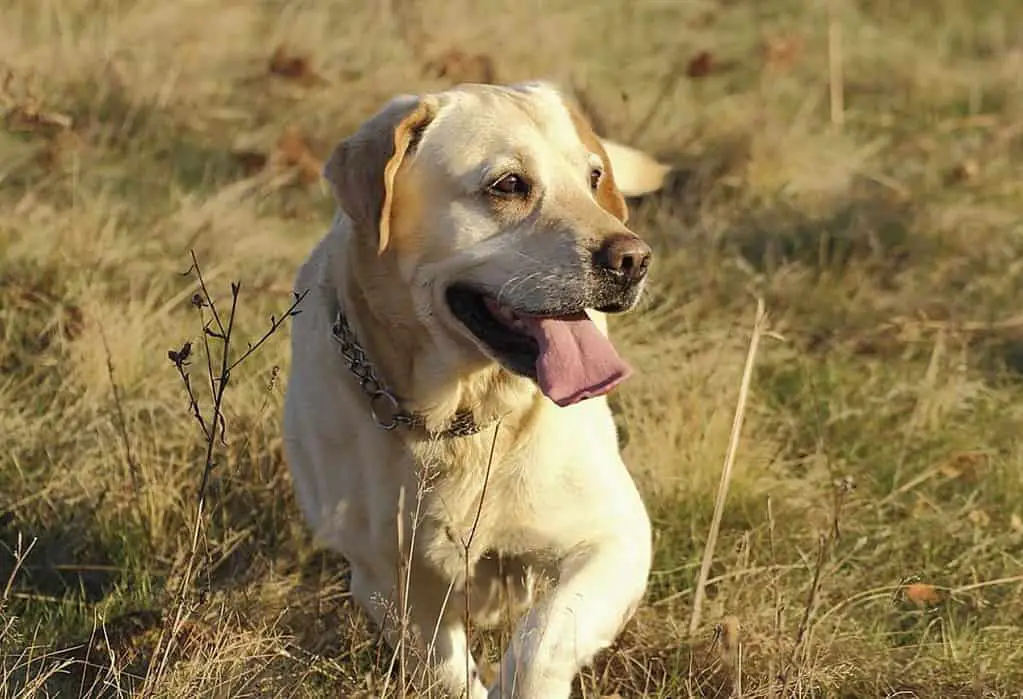
Characteristics Of Labrador Retrievers
- Labrador Retrievers are a medium to large dog breed.
- They were bred for retrieving games and had an inherently strong swimming ability. Their love for water cannot be missed.
- They are friendly, intelligent, loyal, and good-natured with children.
- They have short, dense coats in black to chocolate or yellow.
- Labradors excel as family pets but also make excellent hunting companions.
- Hunters frequently use labs while upland bird hunting.
- Their athletic build, coupled with their high energy level, makes them great running partners too!
- Labs are versatile dogs. They are suitable for agility competitions, search-and-rescue missions, and even therapy dog work.
- Their trainability is another characteristic. It explains why they became one of America’s most popular breeds, according to the American Kennel Club (AKC).
- By nature, Labs enjoy pleasing their owners. They can be trained easily with positive reinforcement techniques like treats and praises!
What is a pointing labrador?
Some Labs can point, although not all of them do. Read on to explore the factors influencing pointing behavior. Know how you can train dogs possessing the pointing labradors’ genes.
History Of Pointing Behavior As Per American pointing labrador association
Pointing behavior in dogs can be traced back to the 17th century. It was when they were originally bred for bird hunting. Using pointing dogs helped hunters locate birds more efficiently.
They would freeze on the scent until the hunter could approach and shoot the bird. Breeds like Pointers and Setters were developed solely for their pointing abilities and became popular in Europe.
In America, Labrador Retrievers were first used as water dogs. Later they were used as upland gamebird retrievers. Not every Lab can become a pointing dog.
Only a subset of Labs selectively bred by some pointing labrador breeders include this trait in their genetic makeup. American Pointing Labrador Association promotes breeding practices that select Labradors that exhibit natural pointing behaviors.
Not all Labradors can be called a pointing lab. These versatile creatures impress with their unique skillset in and out of hunting fields.
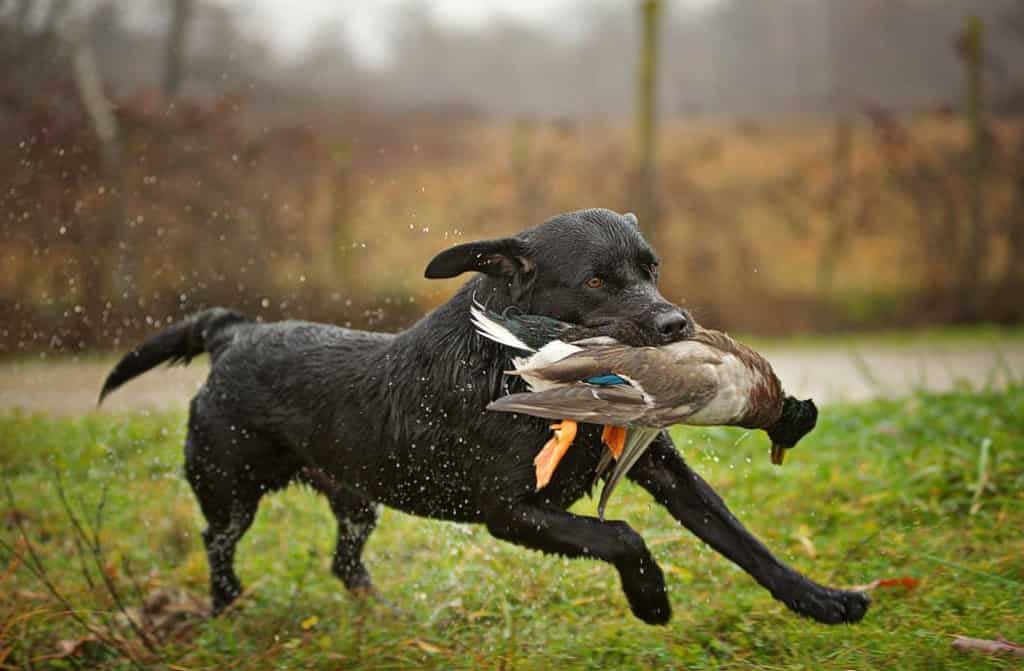
Factors That May Influence Pointing Behavior In Labradors
Several factors can influence pointing labrador retrievers’ behavior.
One factor is genetics, as it determines whether a dog is predisposed to point. While Labradors were mainly bred for retrieving, the breed may still have temperament and hunting style variations.
Training and socialization are other factors. Pointing Labs typically require specialized training. It teaches them to track down birds and contain them until their handler arrives.
Exposing young puppies to different hunting environments early can stimulate instincts. It encourages pointing behavior later on in life.
Exposure to different types of gamebirds can also influence pointing lab behavior. Introducing dogs to upland game birds like pheasants or quail familiarizes them with their scent and habits.
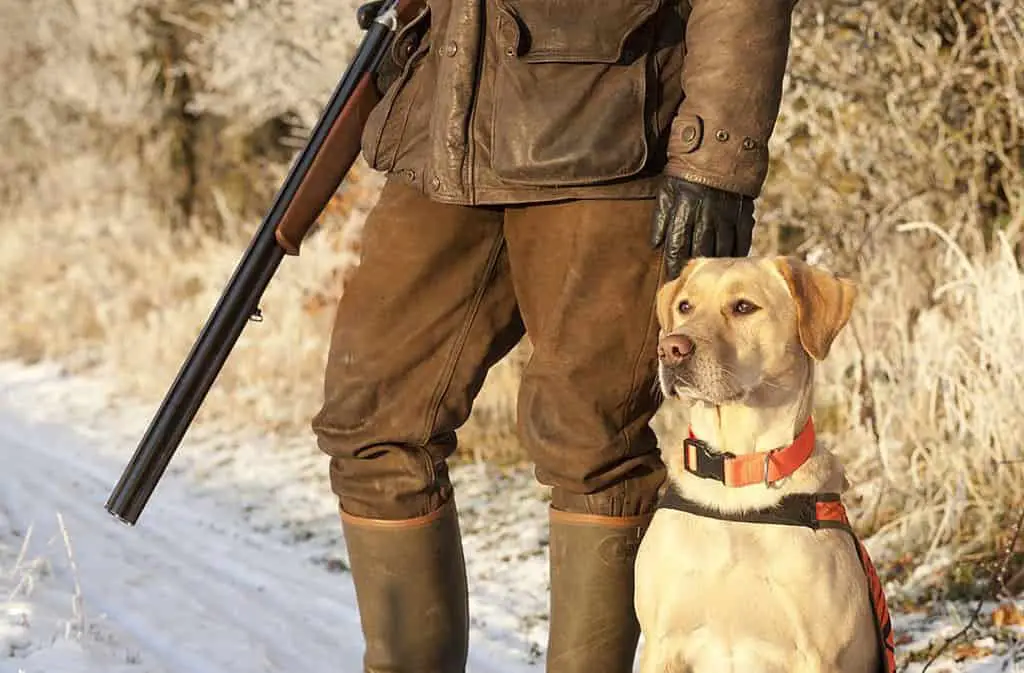
How To Train Your Labrador To Point?
To train pointing labradors, start with basic obedience training. Gradually introduce bird scents and containment techniques while encouraging natural pointing behavior.
3 Training Methods For Pointing Labs
Are you an avid hunter and want your labrador retriever to be more than just a family dog? They can locate the prey and bring it to you. But to do so, they must be able to point. Training is immensely crucial to transform your dog into a pointing lab.
Here are a few training methods that will benefit. Remember to be consistent to see the training yield results.
Whistle Method –
- Start with teaching your dog to stop at the whistle.
- Call the dog over to you from over 20 yards.
- When they stop at the whistle, test their hunting abilities.
- Use a decoy and blow a whistle to stop your dog.
- Keep practicing, and once they master it, use pigeons. The next step is to make the dog respond via smell.
Try it in several locations till your lab stops with the smell. Take it slow and keep the sessions short.
Natural Method –
- Let your lab chase the prey until they realize they can’t catch it.
- Now try it with a launcher. It will teach your lab to point naturally.
- Hold the dog in a way that they cannot catch the bird.
- Drop the check cord and let them chase the bird after launching it.
- Hold the check cord in an unstable terrain and let them chase till the end.
- Not interfering much will help them learn better.
Hold Method –
- Take your lab puppy around the countryside to see a flock of birds and get excited.
- Don’t shoot and let them point themselves. When they stop pointing, ask them to hold.
- Command in a playful voice and reward them if still.
- Now you can take them to prey but don’t get overexcited.
- Blow a whistle and ask them to hold till you return.
- Using a long leash is the best decision for the hold method.
Other Techniques And Tips For Training A Labrador To Point
Patience, time, and dedication are required to train pointing labradors. Here are some techniques and tips to help you along the way:
- Start with basic obedience training: Before teaching your Lab puppy to point, ensure they understand basic commands such as sit, stay, come, and heel.
- Encourage natural behavior: Observe your Labrador’s instincts in tracking scents and sights. If they display any heeding behavior, praise them and encourage them further.
- Use positive reinforcement: Reward your Labrador with treats or praise when they display pointing behavior or follow commands during training.
- Introduce birds: Introducing birds is crucial in training Labrador puppies to point. This involves using live or preserved birds to stimulate their hunting instincts.
- Teach containment: Containment is when a dog points at a bird and holds it in place until the hunter arrives. You can train this behavior using a bird launcher or partnering with someone holding the bird on a string. In the meanwhile, give your dog the command to point.
- Practice regularly: Consistency is key when training your Labrador to point. Practice regularly in different settings like fields or woods.
Starting With Basic Obedience Training
To get a successful pointing lab, begin with basic obedience training. Commands such as sit, stay, come, and heel are essential for building a foundation. It can be achieved through positive reinforcement techniques like clicker training or rewards.
Condition your pup to different environments and stimuli. Do it by taking them on walks and exposing them to new sights and sounds early on.
A consistent daily training program will keep the lessons fresh in their minds and reinforce good behavior.
With these basic skills, you can gradually introduce pointing commands such as “whoa” or “hold.” They are a cue for your pup to stop and locate prey.
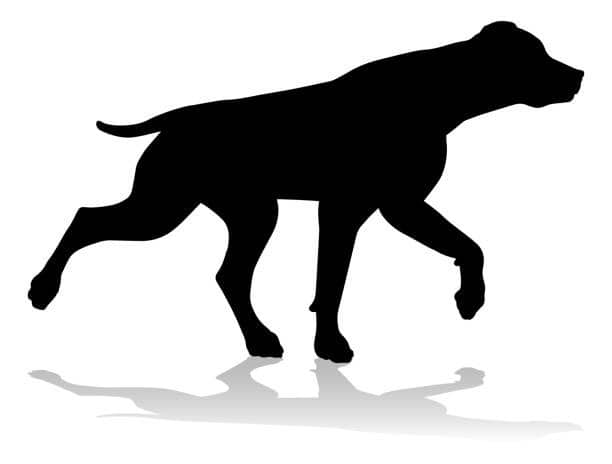
The Importance Of Proper Training And Socialization
Proper training and socialization are essential for Lab pups, regardless of their pointing ability. Therefore, teach your pup basic obedience commands before moving on to more complex skills. A well-trained Labrador is safer both in the field and at home.
Socialization is just as critical as training. Accordingly, socializing your Lab puppies with other dogs, people, and environments when they’re young prevents unwanted behaviors later.
A Labrador might become fearful or aggressive if he isn’t appropriately socialized. Regular exercise in your dog’s routine positively impacts their behavior.
This breed has a lot of energy to burn off daily, so daily walks or runs are necessary!
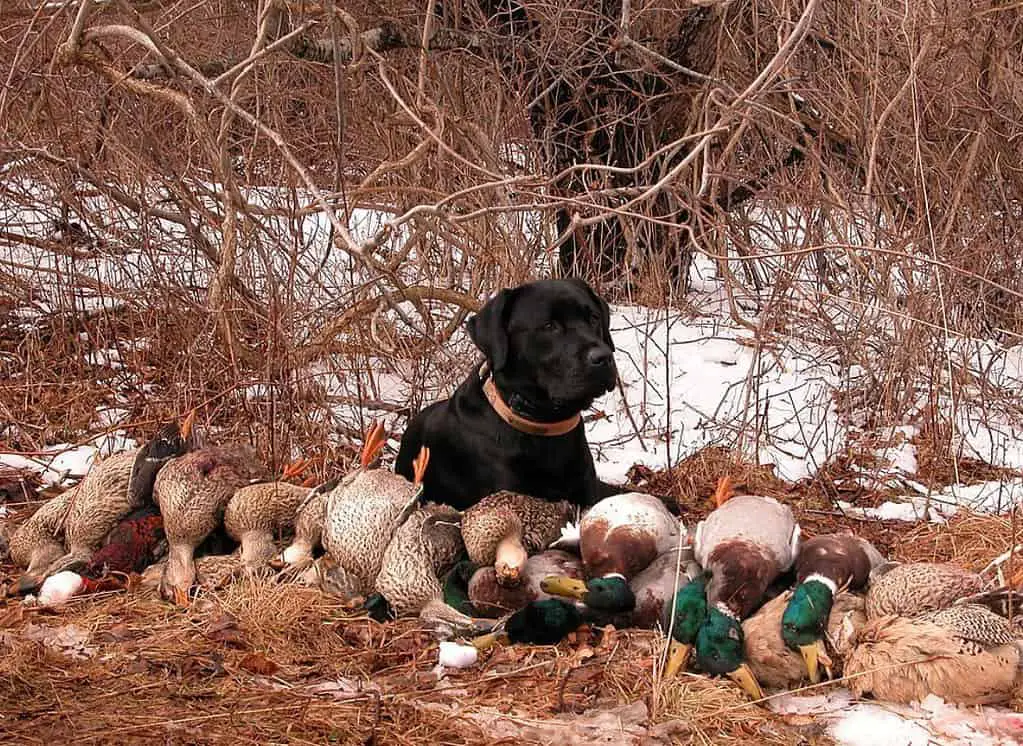
The Unique Personality Traits And Labradors Potential Behavior
Labradors, like all dogs, have unique personalities. It can influence their potential for pointing behavior. Labrador’s strong prey drive and eagerness to please their owners help train them as pointing breeds. These traits can aid in training and prepare them for hunt tests.
Each Labrador is different and may exhibit varying levels of these personality traits. Moreover, some Labrador puppies may naturally prefer retrieving over pointing, while others may require more intensive training. Working with your dog’s natural abilities and temperament is essential.
What Are the Types of Hunting Dogs?
Hunting dogs can be divided into the following three categories –
- Pointing – The prime purpose of pointing dogs is to locate hunters in the location of the game bird.
- Flushing – Pointing and flushing breeds are different. They will act once they have understood the game. They don’t give the hunter time needed to prepare. They immediately pounce on the bird once they identify it.
- Retrieving – Labrador retriever is the most popular retrieving breed. Retrieving breeds have soft mouths not to damage the game they retrieve. It is an extremely important trait. Other breeds include Golden Retriever, Chesapeake Bay Retriever, etc.
Best Pointing Dog Breeds
- Germain Shorthaired Pointer makes the list of excellent all-around hunting dogs. They have been pointing for over 200 years.
- Brittany has made it to the AKC’s list. It has a keen nose and is effective on both land and water.
- Hungarian Pointer or Vizsla has great pointing capabilities and is highly trainable.
- English Setters are among the most popular hunting animals. They have the potential to hunt on different terrains.
Can Breeding Any Dog For Just One Trait A Bad Idea?
Breeding a new puppy for one trait can diminish other characteristics, says John Luttrell, labrador breeder and full-time trainer from South Dakota.
Instead, he suggests breeding a new puppy for two traits or more. The idea is to get a broad spectrum of qualities.
The same applies to the pointing labs. Moreover, breeding a pointing labrador explicitly may result in a less inferior offspring. It goes against the general dog breeding and good practice theory.
As per American Pointing Labrador Association members, the pointing labrador is here to stay no matter what.
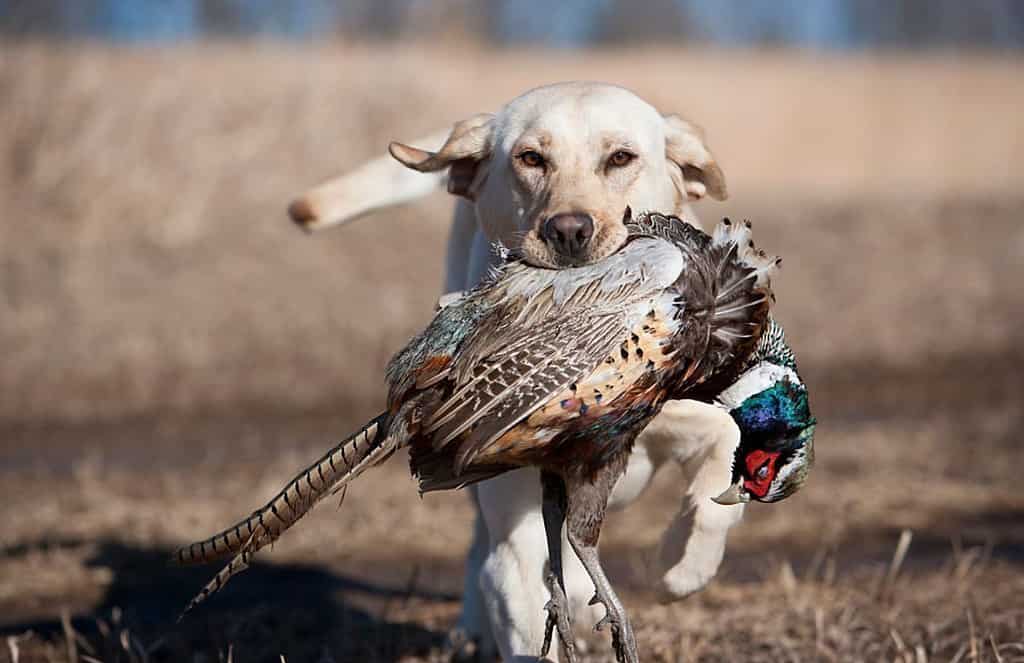
FAQ
Can you teach a Lab to point?
Yes, Labradors can be trained to point with the right training techniques and patience. Additionally, not all Labradors will have a strong natural pointing instinct.
Do Labs make good pointers?
Labs can be trained to point but are not typically bred for this purpose. German Shorthaired Pointers and English Pointers are other pointing breeds.
What is a pointing retriever?
A pointing retriever is a dog breed with both pointing and retrieving instincts. Some examples include the German Wirehaired Pointer and the Spinone Italiano.
What dogs point their paws?
Breeds known for pointing with their paws include the Brittany, the German Shorthaired Pointer, Vizsla, and the Wirehaired Pointing Griffon.
What are pointing labs?
A pointing labrador is a Labrador Retriever bred specifically for their pointing ability. These dogs typically have a stronger natural pointing instinct than other Labradors.
Are pointing labs good?
Pointing Labs can be good hunting dogs for those who prefer a dog that points and retrieves. Research and find reputable labrador breeders to ensure the dog has good health and temperament.
Is it normal for Labs to point?
While Labradors are not typically bred for pointing, they can exhibit this behavior. Some Labradors may have a stronger natural pointing instinct than others.
Why does my Labrador Retriever point?
Labradors may point for various reasons. Basically, it can be for detecting prey, curiosity, or simply because they have a strong natural pointing instinct.
Are Labs ever police dogs?
Labradors are sometimes used as police dogs for detection, search, and rescue tasks. However, they are not typically used for tasks such as apprehension or protection.
Where do Labs like being stroked?
Most Labradors enjoy being stroked on their chest, under their chin, and behind their ears. Paying attention to your dog’s preferences and body language is important.
What are tan points in Labradors?
Tan points in Labradors are areas of light brown or tan fur. It is on specific parts, including the eyebrows, cheeks, chest, legs, and beneath the tail. This coloration is the result of a recessive gene that some Labs carry. Tan points are not considered a fault in Labradors.
Are pointing labs purebred?
Yes, pointing Labs are purebred Labrador Retrievers. They have been selectively bred for their pointing instincts. These dogs have the same physical characteristics and temperament as standard Labs. But they also can point at game birds, which is not a typical breed behavior.
How good are pointing labs?
Pointing Labs possess excellent hunting abilities and make great companions for hunters. They have a strong instinct to locate and point at game birds, making them useful for upland and waterfowl hunting.
What does it mean when a lab is pointing?
When a Labrador Retriever is pointing, they have detected the presence of game birds. They are directing their handler to their location. Pointing is an instinct in some dogs, and pointing Labs have been selectively bred for this trait.
Who owns Iowa Pointing Labs?
Iowa Pointing Labs is a kennel owned and operated by Tim Galeaazi Iowa.
Are Labs clingy dogs?
Labrador Retrievers are known for their friendly and affectionate nature. They may sometimes display clingy behavior towards their owners. They are often called “Velcro dogs” because they follow their owners from room to room and seek out physical affection.
Author Profile
- Site Owner And Dog Lover
-
Aritra, the founder of Labradorandyou.com, is a lifelong dog lover whose passion ignited for Labradors for their loyalty and intelligence. With extensive research and personal experiences, Aritra has become a Labrador expert, offering a rich resource on the breed. Labradorandyou.com provides reliable, timely, and evidence-based information, including Labrador-specific product reviews, training techniques, and care tips.
Labradorandyou.com was born out of Aritra's passion and his desire to share his profound knowledge about the breed. The site serves as a comprehensive resource, offering a wealth of up-to-date information for Labrador owners and enthusiasts alike
Also by the author
-
 Lab-TypesNovember 17, 2023Old Dog Seizures: Causes, Symptoms, and Treatment Options
Lab-TypesNovember 17, 2023Old Dog Seizures: Causes, Symptoms, and Treatment Options
-
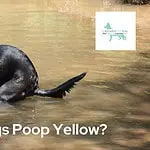 Lab-TypesNovember 17, 2023Why Is My Dogs Poop Yellow? 8 Reasons & Solutions
Lab-TypesNovember 17, 2023Why Is My Dogs Poop Yellow? 8 Reasons & Solutions
-
 ReviewsNovember 17, 2023The Only Hill’s Science Diet Review You Need To Read
ReviewsNovember 17, 2023The Only Hill’s Science Diet Review You Need To Read
-
 Lab-TypesNovember 17, 2023How To Adopt An Emotional Support Dog?
Lab-TypesNovember 17, 2023How To Adopt An Emotional Support Dog?
